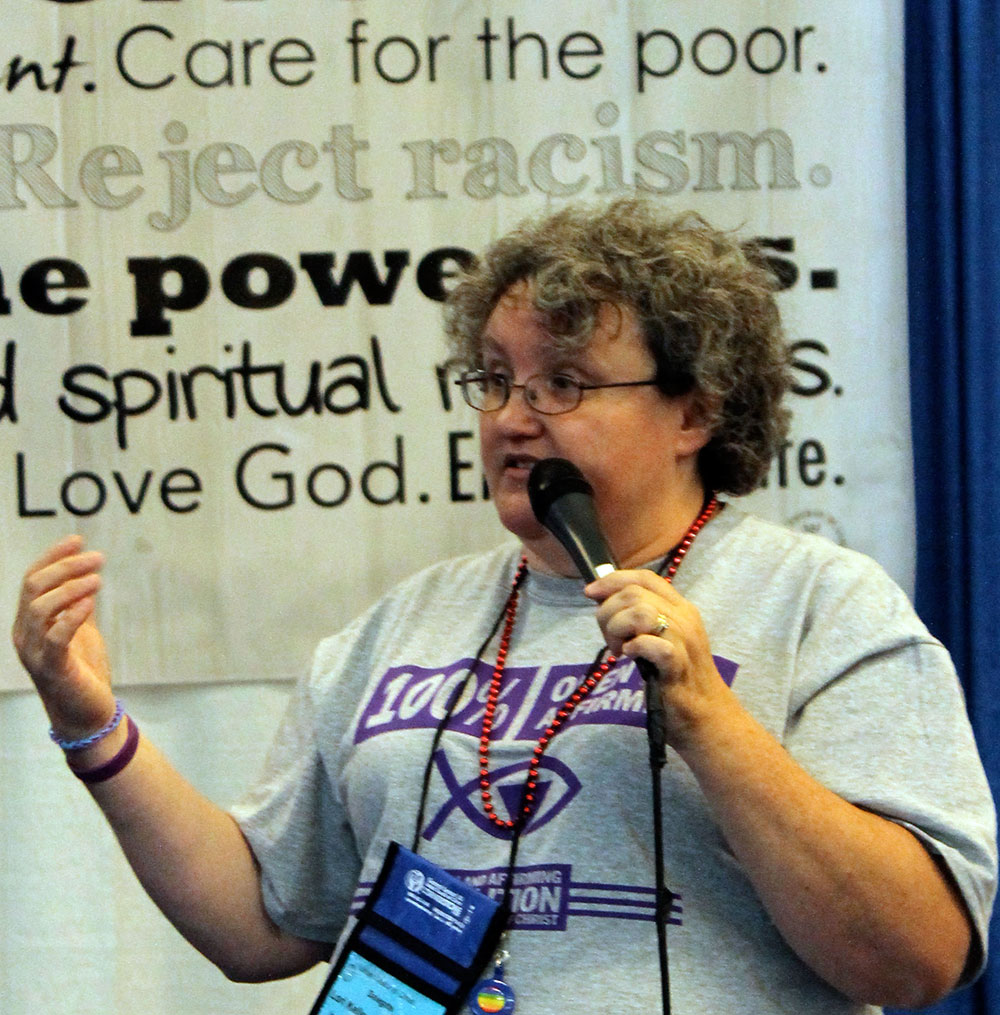Workshops explore myriad of topics to enlighten Synod delegates and visitors
 Synod plenary took a sacred pause Saturday, leaving delegates and visitors to sample a wide variety of workshops. Topics included helping churches grow their ministries, the power of story in the age of Trayvon Martin and Michael Brown, literacy, youth and youth adult ministry, LGBTQ ministry, the Middle East, social media, and ministering to returning veterans, among others.
Synod plenary took a sacred pause Saturday, leaving delegates and visitors to sample a wide variety of workshops. Topics included helping churches grow their ministries, the power of story in the age of Trayvon Martin and Michael Brown, literacy, youth and youth adult ministry, LGBTQ ministry, the Middle East, social media, and ministering to returning veterans, among others.
In “Tools for Turning your Congregation Around,” the Rev. Todd Grant Yonkman and the Rev. Nicole Grant Yonkman, pastors of Beneficent Congregational UCC in Providence, R.I., led an overflowing workshop, with people sitting on the floor and leaning against the walls.
“You won’t achieve redevelopment of your congregation until the pain of not changing outweighs the pain of change,” said Todd.
Nicole agreed. “The future of your church is with the people who haven’t yet come,” she said as she emphasized the need to search out the marginalized within the current congregation and clear the way for new leadership.
In “Why Young People are Leaving the Church,” a panel of seven youth and young adult UCC members discussed why faith communities are losing younger members, suggesting that a that a lack of programming was one of the reasons.
The session gave attendees ideas to reach out to millennials, including offering worship on Saturday nights to accommodate busy schedules, offering care packages to college-age members, or even helping youth and young adults understand why the church engages in mission.
“What brings people into the church is mission — and not just a shallow mission — but what needs to follow is the dialogue,” said Julia LeBrell, a member of St. Paul’s UCC in Dearborn, Mich. “A soup kitchen doesn’t mean anything if there isn’t a conversation about why there are so many people coming to a soup kitchen.”
Serious issues tackled
Down the hall, the Rev. Enja Enos of the Marshall Islands and the Rev. Kachuski Selander from Micronesia –– both islands threatened by ocean rise due to global warming –– discussed the current crisis.
Selander told of a visit to his home in 2010 after many years away. He was born and raised on an island that averages just four feet above sea level. Strips of beach had disappeared. “All tides were high,” he said, gazing around. “Everything is gone.”
The presenters encouraged attendees to educate people at the grassroots, and to promote environmentally sustainable practices.
In another part of the Cleveland Convention Center, Kim Bok Dong shared her story with delegates. During the 1930s and 1940s, the Japanese military — their complicity displayed in their own documents — forced more than 200,000 women from their occupied territories into sexual slavery.
Her story and that of the other halmonies (grandmothers) as Koreans respectfully call them, is tragically not unique. Yoon Mee Hyang, Director of the Korean Council for Women Drafted for Sexual Slavery by Japan, reminded the workshop attendees of the Nigerian girls kidnapped last fall by Boko Haram. Their whereabouts and welfare remain unknown.
“Now it’s your turn to be in solidarity with us,” she said, “so that there will never be another victim like Kim.”
Another workshop included an overview of the Middle East Initiative, an 18-month Global Ministries project that will offer congregations and members from the UCC and Disciples both denominations an opportunity to learn, advocate and witness with partners on the issues the region faces.
“There is no other region in the world experiencing what we are,” said presenter the Rev. Mitri Raheb, pastor of Christmas Lutheran Church in Bethlehem who will preach at the General Synod worship on Monday, June 29. “Your presence there is crucial. We need you to educate people to about what is happening there, and also to share the good news coming out of there.”
Be the Church mini-workshops
Another feature at this year’s Synod are “Be the Church” mini-workshops, informative 30-minute presentations in the Exhibit Hall. Named after a Facebook cover photo that went viral within the UCC, the mini-workshops kicked off successfully on Friday, June 26, with “Face your Facebook Fears: Social Media for Local Churches.”
To a full house, UCC Social Media Associate Marchae Grair discussed “best practices” for Synod attendees who manage church Facebook pages or who want to start pages for their churches but don’t know where to start. The workshop covered topics ranging from proper social media etiquette for page managers to creating images that will go “viral,” or images that get many likes and shares.
“The key to a successful Facebook page is running your page as if you’re talking to strangers,” Grair said. “Many churches think if they talk about themselves a lot, the followers will just come, and that’s not necessarily true. People get invested in pages that talk about things that are relatable and show a lot of personality. That’s why “social” is the first part of the phrase ‘social media.'”
Related News
A Prophetic Call for Justice and Peace in Palestine
The executive leaders of the United Church of Christ have issued the following statement...
Read More‘Love is Greater Than Fear’: Regional Youth Events get to the heart of gospel message
United Church of Christ teens attending this summer’s Regional Youth Events (RYE) are...
Read MoreUCC desk calendars available to order now
Prepare for your day, month and year with the United Church of Christ desk calendar —...
Read More


